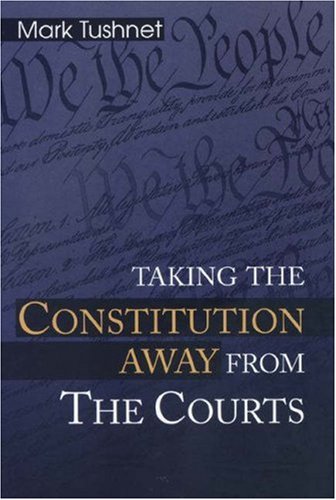|
|
楼主 |
发表于 2008-6-30 07:16:15
|
显示全部楼层
http://rapidshare.com/files/1256 ... gapedia.info__.html

Taking the Constitution Away from the Courts
By Mark V. Tushnet
--------------------------------------------------------------------------------
Publisher: Princeton University Press
Number Of Pages: 242
Publication Date: 1999-02-08
ISBN-10 / ASIN: 0691004153
ISBN-13 / EAN: 9780691004150
Binding: Hardcover
--------------------------------------------------------------------------------
Book Description:
"This is a thoroughly fascinating book by one of our major constitutional thinkers. What makes the book especially notable is that Tushnet not only assesses the possibility of constitutional interpretation outside the courts, but also goes on to deliver an assault on what might be termed constitutional interpretation 'inside' the judiciary. That is, the book becomes a ringing attack on judicial review. This will, no doubt, occasion much debate."--Sanford Levinson, University of Texas at Austin
Here a leading scholar in constitutional law, Mark Tushnet, challenges hallowed American traditions of judicial review and judicial supremacy, which allow U.S. judges to invalidate "unconstitutional" governmental actions. Many people, particularly liberals, have "warm and fuzzy" feelings about judicial review. They are nervous about what might happen to unprotected constitutional provisions in the chaotic worlds of practical politics and everyday life. By examining a wide range of situations involving constitutional rights, Tushnet vigorously encourages us all to take responsibility for protecting our liberties. Guarding them is not the preserve of judges, he maintains, but a commitment of the citizenry to define itself as "We the People of the United States." The Constitution belongs to us collectively, as we act in political dialogue with each other--whether in the street, in the voting booth, or in the legislature as representatives of others.
Tushnet urges that we create a "populist" constitutional law in which judicial declarations deserve no special consideration. But he warns that in so doing we must pursue reasonable interpretations of the "thin Constitution"--the fundamental American principles embodied in the Declaration of Independence and the Preamble to the Constitution. A populist Constitution, he maintains, will be more effective than a document exclusively protected by the courts. Tushnet believes, for example, that the serious problems of the communist scare of the 1950s were aggravated when Senator Joseph McCarthy's opponents were lulled into inaction, believing that the judicial branch would step in and declare McCarthy's actions unconstitutional. Instead of fulfilling the expectations, the Court allowed McCarthy to continue his crusade until it was ended. Tushnet points out that in this context and in many others, errors occurred because of the existence of judicial review: neither the People nor their representatives felt empowered to enforce the Constitution because they mistakenly counted on the courts to do so. Tushnet's clarion call for a new kind of constitutional law will be essential reading for constitutional law experts, political scientists, and others interested in how and if the freedoms of the American Republic can survive into the twenty-first century. |
|